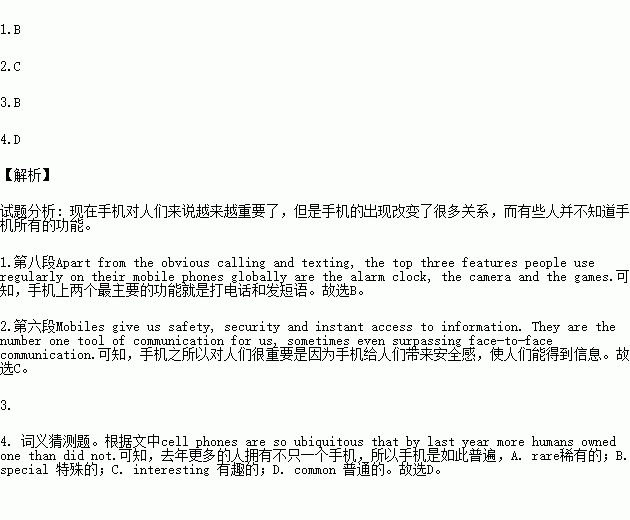题目内容
Cell phone feels like a part of your body? A global survey has found that most people can't live without their mobiles, never leave home without them and, if given a choice, would rather lose their wallet.
Calling mobile phones the "remote control" for life, market research firm Synovate's poll said cell phones are so ubiquitous that by last year more humans owned one than did not.
Three-quarters of the more than 8,000 respondents polled online in 11 countries said they take their phone with them everywhere, with Russians and Singaporeans the most attached.
More than a third also said they couldn't live without their phone, topped by Taiwanese and again Singaporeans, while one in four would find it harder to replace the mobile than their purse.
Some two-thirds of respondents go to bed with their phones nearby and can't switch them off, even though they want to, because they're afraid they'll miss something.
"Mobiles give us safety, security and instant access to information. They are the number one tool of communication for us, sometimes even surpassing face-to-face communication. They are our connections to our lives," Jenny Chang, Synovate's managing director in Taiwan, said in a statement.
Mobiles have also changed the nature of relationships, with the survey finding nearly half of all respondents use text messages to flirt, a fifth set up first-dates via text and almost the same number use the same method to end a love affair.
Apart from the obvious calling and texting, the top three features people use regularly on their mobile phones globally are the alarm clock, the camera and the games.
As for email and Internet access, 17 percent of respondents said they checked their inboxes or surfed the Web on their phones, led by those in the United States and Britain.
One in 10 respondents log onto social networking websites such as Facebook and MySpace regularly via mobile, again led by Britain and the United States.
"As the mobile becomes more and more an all-in-one device, many other businesses are facing challenging times. The opportunities for mobile manufacturers and networks however are enormous," said Synovate's global head of media, Steve Garton.
Not everyone is tech savvy, however: 37 percent of respondents said they don't know how to use all the functions on their phone.
1.According to the passage, the top two regular functions of mobile phones may be ________.
A. camera and game
B. calling and texting
C. email and calling
D. surfing and texting
2.According to Jenny Chang, why is cell phone important for people?
A. There are many functions on their phones.
B. About half of all respondents end a love affair via text.
C. Mobiles make people feel safe, secure and help them to get information.
D. Mobiles used as the tool of communication is not popular with people.
3.What can be inferred from paragraph 1?
A. Cell phone plays an important part in body.
B. As for most of people, wallet is less important than cell phone.
C. More humans would rather own their wallet than cell phones.
D. Poll considered mobile phones as the “remote control” for life.
4.What does the underlined word in Paragraph 2 mean?
A. rareB. specialC. interestingD. common
 字词句篇与同步作文达标系列答案
字词句篇与同步作文达标系列答案
